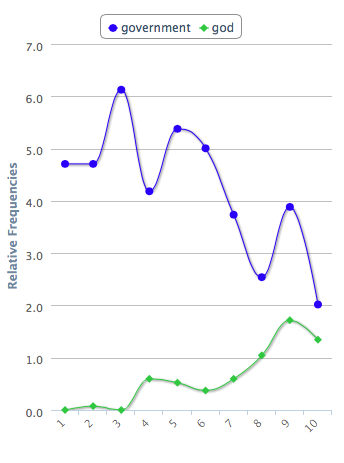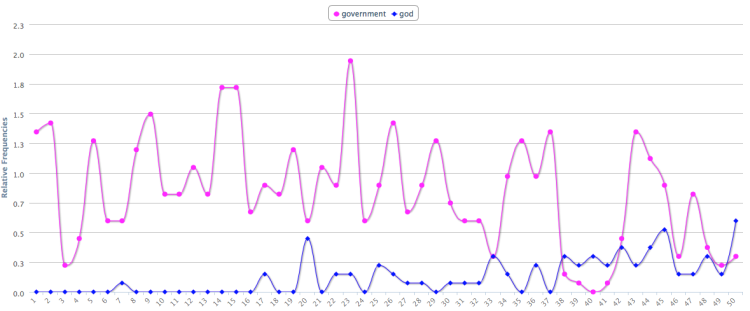Data makes for some uniquely powerful and important studies. Word Clouds are one tool among many used in the field of Digital Humanities. In Word Clouds the bigger the word, the more often the word appears in the original text.
This two part series (see part one here) looks at presidential inaugural addresses. Part one was just the evidence. Part two here will offer some brief questions and analysis.
Combining of all of the speeches together, there are a total of 134,379 words and 9,326 of these are unique (i.e., the total vocabulary used in all of the speeches combined). The most used word is “the” (10,020 times!). After filtering similar words, the most common words are reflected in the Word Cloud above.
Additionally, some of the most interesting ones are:
- government, 594
- country, 295
- constitution, 297
- freedom, 186
- war, 176
- history, 98
- God, 89
- business, 66
- education, 33
- slavery, 25
While by no means a perfect or comprehensive examination, Word Clouds provide an important way to examine what at least some of the big issues of the day were. Word Clouds in ways…capture the unconscious. People are not necessarily aware that they are using the same words and ideas over and over.
Take the following examples of some of the most used words in select inaugural speeches:
- “people” – John Adams 1797
- “public,” “nations,” “rights” – James Madison 1809
- “war,” “country,” “British” – James Madison 1813
- “government,” “states” – James Knox Polk 1845
- “war,” “union,” “God” – Abraham Lincoln 1865
- “government,” “business” – William Howard Taft 1909
- “must,” “world,” “civilization” – Warren G. Harding 1921
- “democracy” “know,” “nation,” “human” – Franklin D. Roosevelt 1941
- “faith,” “world,” “free” – Dwight D. Eisenhower 1953
- “America,” “world,” “must” – William J. Clinton 1993
Like film and other cultural artifact, these speeches and their most used words–and only looking at the words, not the contents or contexts–clearly reflect major issues of their day. The same thing could be said when looking at the most common words of all speeches combined. What does it say about our nation that “war” is the 89th most common word used in all of the speeches?
But, I’m also interested in what these speeches do not discuss or discuss only a little. For example
- women, 30
- soldiers/soldier, 12
- culture, 7
- immigrant/immigrants, 5
- environment, 5
- Indians, 3
- lynchings, 1
- African American/African Americans, 1
- veterans, 0
- sorry, 0
- movies/movie/film, 0
What these speeches discuss is as important as what they do not discuss.
These speeches are also really interesting to me at the movement for at least two other reasons.
1) They provide further evidence that the United States was not established as a Christian nation and that such a notion is not all that promoted in these speeches, even today. “God” does not appear in any inaugural address until 1849, and then only once. In total, “God” or “God’s” appear 103 times and “Lord” 6 times in all of the speeches.
Here’s one interesting chart that maps the use of “God” from the first speech to the most recent one. The real light purple color means zero uses, the darker the color the more uses. This chart does not distinguish between speeches. It only maps chronological change.
One more interesting one. This displays the same data with “government” added as a comparison. As the chart shows, “God” has been used more often over time, and “government” is used less often. 
Here’s the same chart with an increased number of divisions in the data:
2) I have also been very interested in what people call our nation. Do they say “United States,” “United States of America,” or “America”?
“America” or “American” drives me nuts personally. I always say United States or United Statesian.
But, what do presidents say?
This chart follows the use of “United States.”: (The light purple color means zero in that data set.)
And “America”:
Based on a comment by Benedict Anderson in Imagined Communities, I am curious that the United States doesn’t use “United States” more often. Anderson says that names like the United States reject nationalism at least by what they are named. All of the “states’ rights” people should love to use “United States.” “America” implies one place, one government, a nationalistic imagined community.
Charts made possible by: http://voyant-tools.org. All of the options are really neat, and provide a unique way of reconsidering information and history.




